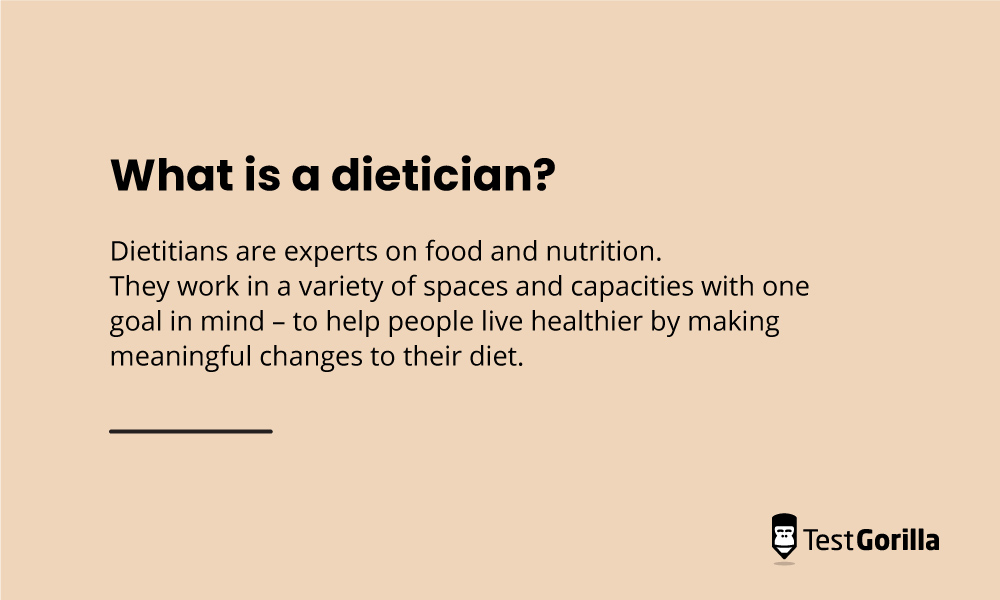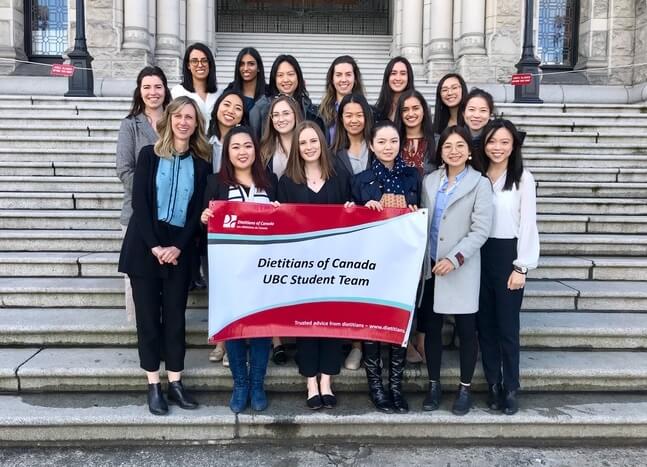All Categories
Featured
Table of Contents
-1
And if you want to enter the food and nourishment industry, it deserves understanding what those distinctions are now. This quick failure must provide you a good idea. Dietitians aid their clients browse the connection in between food and health. They do this by equating the most up to date scientific and clinical research study right into useful suggestions that people can apply to their lives.
-1Nutritionists normally operate in group settings, educating wider communities and organisations. They can also function in various other fields such as: Evaluation policies and regulations around foods, including top quality checks. Make sure that food is produced to fulfill food safety and security standards. Develop programs and interventions to help the larger public address food problems.
-1The primary distinction to comprehend is that the nourishment career isn't regulated in Australia. This suggests that technically, any person can call themselves a 'nutritional expert', while you need to have an authorized dietetics qualification to be a dietitian. To shield correctly practicing nutritionists, the Nourishment Culture of Australia has a Register of Nutritionists.
-1The ordinary income for a nutritionist is $75,000 per year. This can range from $60,000 to $90,000, depending on the duty.
Personal Dietitian – Woodbridge
-1Keen to collaborate with customers on their dietary goals sooner instead of later? Research a level in nutrition. Want to take your expertise also better, and assist deal with diet-related clinical conditions? After that a profession as a dietitian could be right for you. In either task, you will certainly play an important function assisting people make the best decisions for their diet and health and wellness.

-1
Dietitian and nutritional expert: both of these occupations function around diet regimen and food, but are they the same? What specifically is the difference between a dietitian and a nutritional expert?
-1Regardless of the differences in credentials between a dietitian versus nutritionist, the salaries are quite comparable. Both nutritional experts and dietitians make approximately $75,000 to $95,000 a year however, salaries can differ considerably depending on place and experience. While there is a greater need for certified dietitians, nutritional experts tend to have greater work fulfillment.
Vegan Dietitian
-1You can work in a large variety of markets for a wide range of organisations and even for on your own. If you're still not exactly sure about whether to become a dietitian versus a nutritionist, the adhering to might help you make a decision. As a dietitian, you can enjoy an occupation as a: a registered dietitian or dietitian nutritionist is a person who operates in the basic area of dietetics, prescribing diet regimens, supplementation and dietary aids to sustain healthy and balanced way of lives and condition administration.
-1To become across the country accredited, dietiticians should join the Accredited Practising Dietitian (APD) program and end up being a member of Dietitians Australia. Whether dietitian or nutritionist is a better profession for you better depends on your personal preferences. It is necessary to note that all dietitians are nutritional experts, however not all nutritionists are dietitians.
Holistic Nutrition Coaching – Woodbridge
-1Both occupations are entailed with aiding individuals achieve their health objectives through food education and learning, however there are several aspects that establish them apart. If you have an interest in recommending individuals on nutritional and dietary issues, you may have what it requires to become a nutritionist or dietician. The area of food scientific research is extremely wide, supplying a variety of profession chances to certified experts.
-1Nutritionists specialise in supplying evidence-based recommendations and solutions related to nutrition. Via routine appointments, nutritionists aid clients recognize the link between diet regimen and health and wellness so they can make even more enlightened choices around food and live a much healthier way of living. Nutritionists generally function with customers on a specific basis, although they likewise deal with teams with a specific goal (e.g.
Registered Dietitian For Weight Loss (Woodbridge)
-1Despite the fact that you don't need to study to end up being a nutritional expert, doing so can enhance your opportunities of progressing your profession in this field. Courses that have a specialized in Nourishment, like the HLT43015 Certification IV in Allied Health And Wellness Help (Nutrition and Dietetics Specialisation), are developed to create your understanding of the connection in between food and health, permitting you to offer expert guidance on nutrition.
Naturopathic Nutritionist (Woodbridge 6056)
-1Jul 09, 2018 Australia currently does not regulate the specialist titles 'nutritional expert' or 'dietitian', leaving a large market for misinformation if you do refrain your own research. The media also tends to utilize the two terms mutually, making distinctions between credentials increasingly challenging. Continue reading as we break down the differences in between these occupations, their relevant credentials, what they can do for you and what to look for when looking for a specialist to assist you.
-1You have chosen that you need to improve your wellness and that functioning on your diet is the finest location to begin. You have found out about the benefits of collaborating with a dietitian or a nutritional expert, yet you aren't sure which you need or exactly how to pick that to deal with.

-1
The main distinctions are the kind of research that has actually been completed by each professional, and the policies connected to each title. A dietitian has actually met the nationwide and global standards for professional regulation. Dietitians are the only nutrition experts to be managed by legislation, and they are regulated by an ethicality (a lot like medical professionals are) to make certain that they constantly function to the highest criterion.
-1On the other hand, somebody who has the title of a nutritionist is not shielded by regulation in many nations, and it is not a controlled term. All dietitians are considered to be nutritionists; however, nutritionists without a dietetics credentials can not handle the specialised role of a dietitian. For somebody to become a registered dietitian, they require to have actually completed a 4 year university degree in Nutrition and Dietetics, or a 3-year science level adhered to by a Masters Degree in Nutrition.
Nutritionist Services – Woodbridge

-1
Currently that all of this information has been offered, we can redirect our emphasis to the rival end of this dietician vs nutritional expert argument. Dietitians will certainly still organise food and nourishment plans, in order to advertise a healthy way of living amongst their clients.
-1Dieticians can likewise function in instructional facilities such as Colleges. As opposed to this, the biggest difference in between a nutritional expert and dietitians in the UK is that nutritionists to operate in clinical sectors. Sports Nutrition Counseling. Instead, they can work within the health and health and fitness sector in roles such as dietary experts in food distribution business, along with a personal fitness instructor that gives advice and suggestions to their customers
-1This brings us on to talking about the next difference between a diet professional and nutritional expert in the UK. You may have reviewed this heading and questioned 'is there a distinction between a diet professional and a nutritionists' customers?'. It's just natural to assume that any person seeing either specialist will certainly be doing so for similar reasons, however this is not the situation.
Latest Posts
Our Values – Spearwood
The Truth About Weighing Yourself – Katanning
Plant-based Dairy- Health Or Hype? ( Stirling 6017)